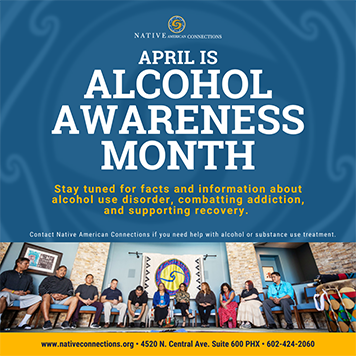apartmentApply to Osborn Pointe! Learn more about this 55+ community in Phoenix - NOW LEASING!

With increasing alcohol use among adults during the pandemic, Native American Connections is raising alcohol awareness this month to support healthy habits in our community. We're committed to providing high quality behavioral health services including alcohol and substance use treatment with both outpatient and residential programs alongside our affordable and permanent supportive housing. Check out the following alcohol awareness update from our team. Stay aware and stay safe by prioritizing alcohol awareness.
According to a study by JAMA Network Open, more people have turned to alcohol to cope with the stressors brought about by the COVID-19 pandemic. Being at home for extended periods of time, coping with unemployment or being overworked, managing children’s schooling while working from home, or dealing with the loss of loved ones due to the pandemic can all lead to increased alcohol consumption as a means to cope. In recognition of National Alcohol Awareness Month, we're sharing the ways in which our multi-faceted approach to addressing substance use can be effective in mitigating the long-term effects.
Consider the following quote from our CEO Diana Yazzie Devine, given during Alcohol Awareness Month. “While consuming alcohol may start out as a way to cope with stressors, particularly those that have been brought about by the pandemic, the reality is that excessive alcohol consumption can lead to more problems, including depression, family conflict, and long-term mental and physical health issues."
Recognizing the factors of alcohol use that effect your life is the first step to gaining control over an alcohol use disorder. The Centers for Disease Control and Prevention defines excessive alcohol consumption as four or more drinks during a single occasion or eight drinks or more per week for women, and five or more drinks during a single occasion or 15 or more drinks per week for men. The JAMA Network study found that alcohol consumption among adults increased by 14 percent from 2019 to 2020; women exhibited a 41 percent increase in alcohol consumption. This could be due to the fact that, in addition to increased stress, the usual healthy coping mechanisms have been limited by the pandemic and many have been isolated from familiar social support networks.
Learning healthy coping mechanisms creates a pathway to hope, wellness, and an improved quality of life. At Native American Connections, our approach to healing is holistic, confronting the mental and physical aspects of addiction and substance use. If you're seeking help for alcohol or substance use, reach out to our health team at 602-424-2060 or intake@nativeconnections.org and visit our behavioral health page for additional information.
Our traditions are the foundation of our organization - explore, learn, and utilize resources available for all.

Get the support you need with health, housing, and community services available at Native American Connections.

Your support changes lives and builds healthy communities. Find ways to get involved.

A "chronically homeless" individual is defined to mean a homeless individual with a disability who lives either in a place not meant for human habitation, a safe haven, or in an emergency shelter or in an institutional care facility if the individual has been living in the facility for fewer than ninety (90) days and had been living in a place not meant for human habitation, a safe haven or in an emergency shelter immediately before entering the institutional care facility. In order to meet the ‘‘chronically homeless’’ definition, the individual also must have been living as described above continuously for at least twelve (12) months or on at least four (4) separate occasions in the last three (3) years, where the combined occasions total a length of time of at least twelve (12) months. Each period separating the occasions must include at least seven (7) nights of living in a situation other than a place not meant for human habitation, in an emergency shelter or in a safe haven.
Federal nondiscrimination laws define a person with a disability to include any (1) individual with a physical or mental impairment that substantially limits one or more major life activities; (2) individual with a record of such impairment; or (3) individual who is regarded as having such an impairment. In general, a physical or mental impairment includes, but is not limited to, examples of conditions such as orthopedic, visual, speech and hearing impairments, cerebral palsy, autism, epilepsy, muscular dystrophy, multiple sclerosis, cancer, heart disease, diabetes, Human Immunodeficiency Virus (HIV), developmental disabilities, mental illness, drug addiction, and alcoholism.